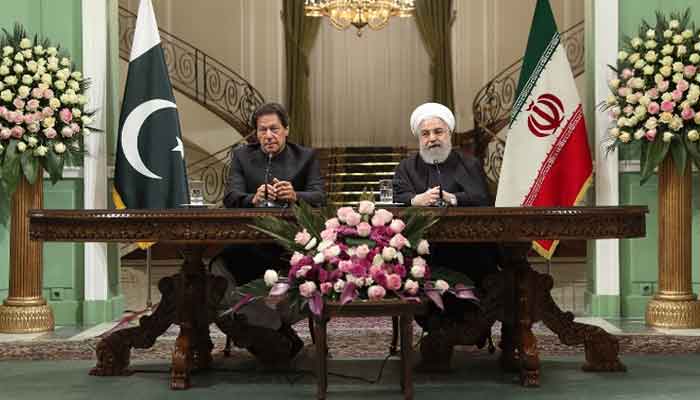Naya Pakistan looking for Iran like revolution, says Imran
Prime Minister Imran Khan, while speaking at a joint press conference with the Iranian President Hassan Rouhani, said that we support Iran’s Islamic Revolution and the new Pakistan is looking for such a revolution.
TEHRAN: Pakistan and Iran on Monday agreed to boost security cooperation and set up a Joint Rapid Reaction Force to fight terrorism and guard the common border between the two countries.
Leadership of both the countries also agreed to further strengthen the bilateral trade and economic ties. Prime Minister Imran Khan, while speaking at a joint press conference with the Iranian President Hassan Rouhani, said that we support Iran’s Islamic Revolution and the new Pakistan is looking for such a revolution. He said both the countries would not allow terrorist activities from their sides and security chiefs of the two countries would discuss ways of cooperation.
The prime minister expressed the hope that this would build confidence between the two countries to reach the conclusion that they would not allow their soils to be used against each other.
This government in Pakistan for the first time is dismantling militant groups in the country and this was not done from any outside pressure, he said. He said it is a decision made through consensus across the political spectrum that “we will not allow our soil to be used by anyone against anyone.”
“In the last 12 to 13 years Pakistan had suffered a lot from terrorism where 70,000 of our people lost their lives in terrorist activities,” he said. “We are luckier than Afghanistan which despite Nato’s strength and Afghan security forces could not tackle militancy as Pakistan did,” he said.
Imran Khan, along with a delegation, was on his maiden two-day official visit of Iran, atthe invitation of Iranian President Hassan Rouhani, to strengthen bilateral and commercial relations.
He said a few days back, 14 Pakistan security personnel were martyred by terrorists in Ormara, Balochistan, adding that he knew Iran had also suffered from terrorism. Imran Khan said that four decades of war in Afghanistan had affected both Pakistan and Iran, adding peace in Afghanistan was in the interest of both the countries.
“We will cooperate with each other in helping political settlement of Afghan issue as peace in the war-torn country will help both Pakistan and Iran, the prime minister said. Iran and Pakistan have agreed to set up a joint border "reaction force" following a number of deadly attacks by militant groups on their frontier, Iranian President Hassan Rouhani announced on Monday after talks with visiting Pakistani Prime Minister Imran Khan.
"We agreed to create a joint rapid reaction force at the borders for combating terrorism," Rouhani told a joint news conference, following months of increased tensions over attacks on both sides of the frontier.
Khan’s visit to Iran, the first since he took office last year, comes after gunmen who Islamabad says were based in Iran killed 14 members of Pakistan’s security forces last week in its own Balochistan province.
"The security chief will sit down with his counterpart here and discuss (security) cooperation," Khan said, although no details were given on the joint force. "We trust that both countries will not have terrorist activities from their soil ... We will not allow any damage to your country from our soil," said the Pakistani premier.
Stressing that "no third country" could harm Iran-Pakistan ties, an apparent reference to the United States and its policy of isolating the Islamic republic, Rouhani said Tehran was ready to boost trade and business ties with Islamabad.
"In the current situation, the region’s countries must decide and plan for their interests
independently and directly," Rouhani said. For his part, Khan said his visit to Tehran aimed to "find ways to increase trade and cooperation... in energy and other areas", noting that two-way trade was "very limited".
According to the joint statement, Khan visited the holy shrine of Imam Reza (AS) in the city of Mashhad on 21 April 2019 and held delegation-level talks with Rouhani and also met with the Leader of the Islamic Revolution Grand Ayatollah Seyyed Ali Khamenei.
While emphasising historical, cultural, religious and civilizational ties between the two countries, and highlighting the commitment of the senior officials of the two countries to expand relations in all areas of mutual interest, the two sides reiterated the importance of deepening and reinforcing bilateral ties based on principles of national interest, territorial integrity and mutual respect for national sovereignty. They called for swift implementation of bilateral agreements as a step towards realising this important goal.
Both sides highlighted that common borders should be the borders of peace and friendship, and acknowledged the necessity of forging regular cooperation and exchange of views between political, military and security officials of the two countries to combat threats such as terrorism, smuggling of narcotics, human trafficking, hostage-taking, money-laundering and abduction. It was also agreed that the 10th Round of the Special Security Committee of the two Ministries of Interior will be held in Islamabad in June 2019 to discuss these matters in detail.
It was also agreed that the next meeting of the Joint Consular Commission would be held in second half of 2019 to review the progress made so far and chart the way forward in further facilitating the movement of people from both sides. The Pakistan side welcomed the initiation of the process for release of a number of Pakistani prisoners by the Government of Iran, and for making arrangements for their expeditious repatriation to Pakistan.
President of Iran and Prime Minister of Pakistan agreed that enhancing and cementing cooperation between Iran’s Sistan-Balochistan Province and Pakistan’s Balochistan Province including opening of new border crossings and border markets would contribute towards improvement of the economic situation of local residents, and further constitutes a step towards resolving the border challenges and insecurities. Both sides agreed to hold the second round of High Border Commission in Islamabad in May 2019 to review the current status of preparations and further measures required for the earliest opening of new crossing points at Gabd-Reemdan and Mand-Pishin, besides opening of new border markets.
Reaffirming the importance of strong and historic socio-cultural and linguistic affinities between the two countries and their peoples, both sides reaffirmed the need to further strengthen these bonds through promotion of academic, cultural and tourism activities, particularly by encouraging more frequent exchange of visits of intellectuals, folk artists, cultural troupes and by enhancing tourism to the historic religious sites in both countries.
Prime Minister Imran Khan reaffirmed the support and solidarity of the Government and people of Pakistan with the people of Iran over loss of precious human lives and material damages due to recent severe floods in Iran. He expressed the conviction that the people of Iran would handle this natural calamity with their characteristic resilience. The Iranian side expressed its gratitude to Pakistan for sending humanitarian assistance to the flood-affected people in Iran.
Both sides welcomed the signing of a declaration for cooperation in health sector aimed at bilateral technical assistance and experience sharing with tangible outputs. Considering the increase in volume of trade between the two countries in 2018, the President of Iran and Prime Minister of Pakistan instructed relevant institutions and ministries to devise all required mechanisms for boosting monetary, financial and commercial activities to their full potential by utilising all available options. The two sides also decided to hold the 21st round of the Joint Economic Commission (JEC) in the second half of 2019 in Pakistan to deliberate further on these issues.
Both sides discussed and exchanged views on major regional and international issues, and asserted that peace, tranquility and sustainable development are prerequisite for enhancing relations, integrity and synergy among the West Asian countries.
Both sides reaffirmed their commitment to the UN Charter and international law, in particular the principles of sovereign equality of states, political independence and non-interference in the internal affairs of States. The two sides reiterated the need for all states to adhere to the rule of law including at the international level. In this context, they expressed serious concerns over unilateral application of measures by any country that are inconsistent with the provisions of international law and the principles of UN Charter.
The President of Iran and Prime Minister of Pakistan, referring to the necessity of establishing a safe, stable and independent Afghanistan for the sake of regional peace and stability, acknowledged the necessity of holding Afghan-led and Afghan-owned peace dialogue while calling upon regional countries and the international community to work collectively to end the conflict and restore complete peace in the country. Both sides also agreed to join efforts for achieving a broader regional consensus in this regard.
While condemning terrorism in all its forms and manifestations, both sides acknowledged the great achievements of the two countries in combating terrorism and emphasized that efforts to develop regional and international cooperation in preventing and countering terrorism should be redoubled and the root-causes of all types of terrorism in the region identified and addressed.
Considering the importance of developing connectivity and transit corridors in order to accelerate and facilitate bilateral and regional cooperation and trade, both sides welcomed the implementation of bilateral and multilateral agreements, including the Belt and Road Initiative (BRI) and China-Pakistan Economic Corridor (CPEC), as well as agreements on establishing the North–South and East–West corridors in Iran.
The President of Iran and Prime Minister of Pakistan welcomed all dimensions of cooperation of the two countries with other states, particularly the six-party Speakers’ Conference in Tehran with the purpose of consolidating cooperation among the regional states.
Both sides highlighted the need to resolve the issue of Jammu & Kashmir through dialogue and peaceful means based on the will of the people of that region and in line with the resolutions of the United Nations Security Council.
The President of Iran and Prime Minister of Pakistan emphasised that the right of the people of Palestine to establish an independent and sovereign Palestinian state should be respected as the key demand of the Muslim states. Both sides also agreed to reinforce endeavors through regional and international arrangements and mechanisms to help the Palestinians establish an independent state.
Both sides stressed on swift and complete implementation of the Joint Comprehensive Plan of Action (JCPOA) by other states considering the full compliance of the Islamic Republic of Iran to its provisions.
The Prime Minister of Pakistan expressed his appreciation to the President of the Islamic Republic of Iran for the warm and generous hospitality extended to the Pakistani delegation, and officially invited H.E. Dr. Hassan Rouhani to visit Pakistan at the earliest convenience. The President of Iran accepted the gracious invitation. Dates for the visit will be worked out through diplomatic channels.
-
 John F. Kennedy Jr. Wife Carolyn Bessette's Last Minute Bridal Crisis Revealed
John F. Kennedy Jr. Wife Carolyn Bessette's Last Minute Bridal Crisis Revealed -
 Mary Cosby Remembers Son Robert Cosby Jr. After His Tragic Death
Mary Cosby Remembers Son Robert Cosby Jr. After His Tragic Death -
 Prince Harry, Meghan Markle Face 'largely Unfair' Criticism After Jordan Trip
Prince Harry, Meghan Markle Face 'largely Unfair' Criticism After Jordan Trip -
 Priscilla Presley Makes Sweet Confession About TV Role: 'I Lied'
Priscilla Presley Makes Sweet Confession About TV Role: 'I Lied' -
 Prince Harry Feels 'hurt' For Archie, Lilibet
Prince Harry Feels 'hurt' For Archie, Lilibet -
 Keith Urban, Nicole Kidman's Daughters Choose One Parent To Side With
Keith Urban, Nicole Kidman's Daughters Choose One Parent To Side With -
 Sarah Ferguson's Hidden Trait Exposed As Expert Dismantles Shadow Side To Her Personality
Sarah Ferguson's Hidden Trait Exposed As Expert Dismantles Shadow Side To Her Personality -
 Sarah Ferguson Backed By Powerful Friends Amid Epstein Fallout
Sarah Ferguson Backed By Powerful Friends Amid Epstein Fallout -
 PINK’s Latest Move Sparks Speculations About Replacing Major Celebrity On Show
PINK’s Latest Move Sparks Speculations About Replacing Major Celebrity On Show -
 Planetary Parade 2026: Here's How To See Six Planets Aligning Today
Planetary Parade 2026: Here's How To See Six Planets Aligning Today -
 Christopher Nolan Reveals Why He's A Fan Of 'Fast & Furious' Movies
Christopher Nolan Reveals Why He's A Fan Of 'Fast & Furious' Movies -
 Ben Affleck Unable To Accept A New Lover Post Jennifer Lopez Divorce As He Still Grieves End Of Bennifer 2.0
Ben Affleck Unable To Accept A New Lover Post Jennifer Lopez Divorce As He Still Grieves End Of Bennifer 2.0 -
 Why Is Demi Moore Being Called Ozempic Victim?
Why Is Demi Moore Being Called Ozempic Victim? -
 Kaley Cuoco Makes Honest Comparison Of 'Big Bang Theory' And 'Charmed' Gigs
Kaley Cuoco Makes Honest Comparison Of 'Big Bang Theory' And 'Charmed' Gigs -
 Robert Picardo Shares Surprising Reaction On Returning To The 'Star Trek' Franchise
Robert Picardo Shares Surprising Reaction On Returning To The 'Star Trek' Franchise -
 AI Feud Deepens As Musk Targets OpenAI Over Safety Concerns
AI Feud Deepens As Musk Targets OpenAI Over Safety Concerns




